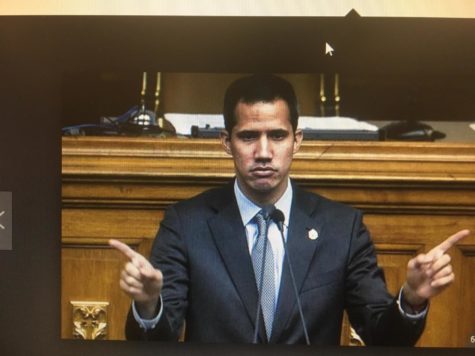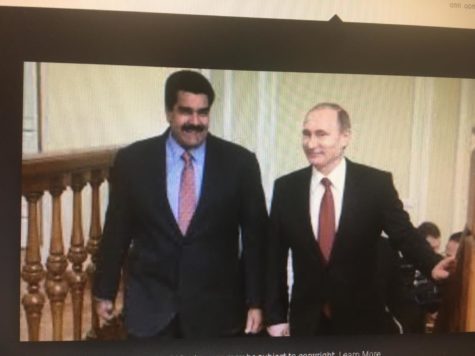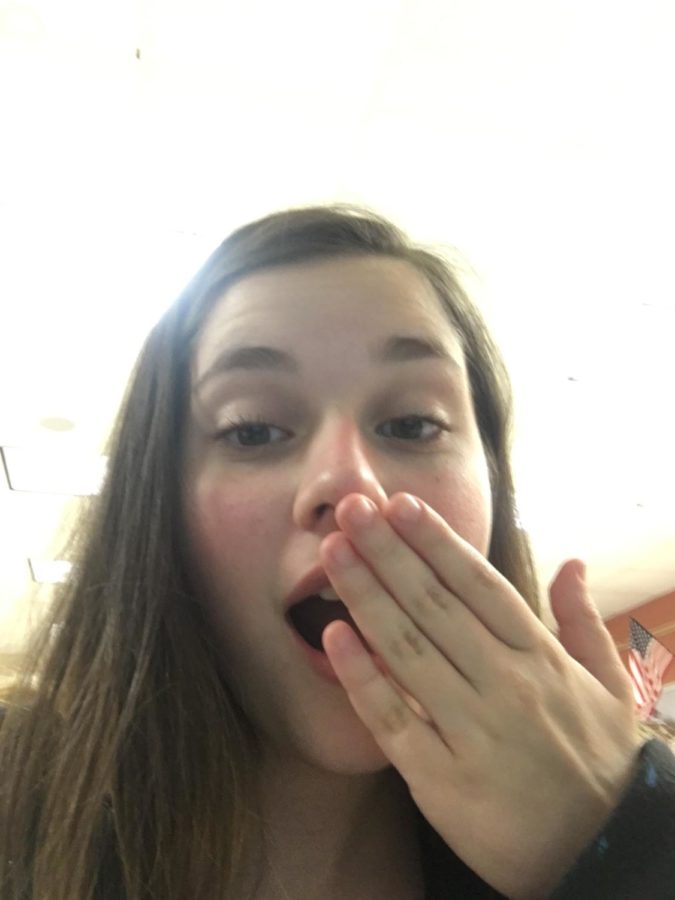Guaido Defies Travel Ban and Returns Home
Guaido defies the travel ban that was placed on him and returns home, completely illegally.
Journalism student Evelyn Arnold reacts with shock and horror upon hearing Maduro’s terrifying claims.
Days ago, self declared president and overwhelmingly popular Venezuelan opposition leader, Juan Guaido touched down in Maiquetia Airport after a 10 day humanitarian aid tour of the South American Allies. Despite threats and supposed action against him by the Maduro regime and Venezuela’s tilted supreme court, he was welcomed with open arms and greeted by diplomats from the United States as well as ambassadors to Germany and The Netherlands. Citizens flooded the entire area cheering and making way for diplomats and ambassadors who came for similar reasons. After vocalizing an assumption that he would be detained, Guaido strolled right through security with his masses, mockingly saying, “someone didn’t follow an order.”
Long before such bold steps were taken today, Guaido was still working to make a difference. Mid February marked a mobilization of protective brigades organized by Guaido himself. For some time any US airdrops of aid supplies have been blocked with frightening resilience and dedication from crossing Venezuela’s borders. Volunteers were able to retrieve items left at the border rather than forcing United States aircraft to risk escalation by flying through restricted airspace.

More recently though, it would seem things escalated regardless. On Saturday, opposition activists were gunned down as they tried to bring aid to the decimated families of the area. Their single transgression was possession of banned items: food and water. In a recent interview with Euronews, Guaido stated expressly that he was, “ready to die for his country’s future.” He explained in depth his stance against Maduro and his preparation to retaliate against his unjust movements. These bold and warmly recieved statements came after gaining full support from Europe and the United states as well as being voted in by Venezuela’s national assembly.
In this same interview, Guaido was able to bring attention to many points brought up and questions asked against him. Propaganda from Maduro had been attempting to portray him as organizing a coup and inciting a civil war. Both items were quickly dispelled by Guaido as he explained that not only were his constituents all volunteers working towards a greater good and not a paid military group, no civil war would be started for a leader (Maduro) that had brought nothing but misery and pain to so many people.
On two other points, Guaido vehemently brought to light the atrocious conditions in almost all Venezuelan hospitals. After working so hard for so long to improve healthcare and the conditions of medical centers, Maduro, through ignorance by choice, has allowed them to fall apart all over again. Inordinate numbers of children are dying every single day due to a severe lack of any necessary medical supplies. Despite these atrocious conditions, Maduro has been placing his focus unendingly on Guaido. He has been sent even more recent threats to imprison him and his family, and yet still maintains that he will travel back to Caracas this weekend and provide any support he can. Once again, Guaido is working to do good in spite and in the face of evil.

On other fronts, Guaido is working to convince both Russian and Chinese government and economic organizations that ceasing ties with Maduro is by and large the most economically sound decision. These key arguing points centered around Venezuela’s collapsing economic output: once outputting 3 million barrels of oil per year, those numbers have suddenly fallen to one million under the Maduro Regime.
Now being called a leader of the crazed minority, Guaido is moving in to set up strikes all throughout Venezuela’s public sector. His goal is that in giving the millions and millions of oppressed government workers an opportunity to show their disdain for Maduro’s actions, he would be further constrained and isolated. Ideally this would lead to him losing power completely as the last of his supporters leave him stranded. Not even Washington sees a future role for him in government. After talks on tuesday, Elliott Abrams, the top envoy for Venezuela said he found it incredibly difficult to see a role for Maduro in any democratic future For Maduro in coming elections. He ended with, “If he wanted to build a democratic Venezuela, he had the opportunity to do so, but he did not.”




